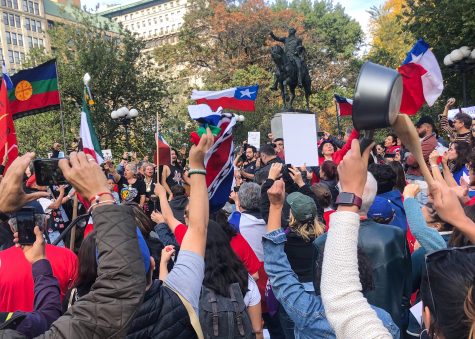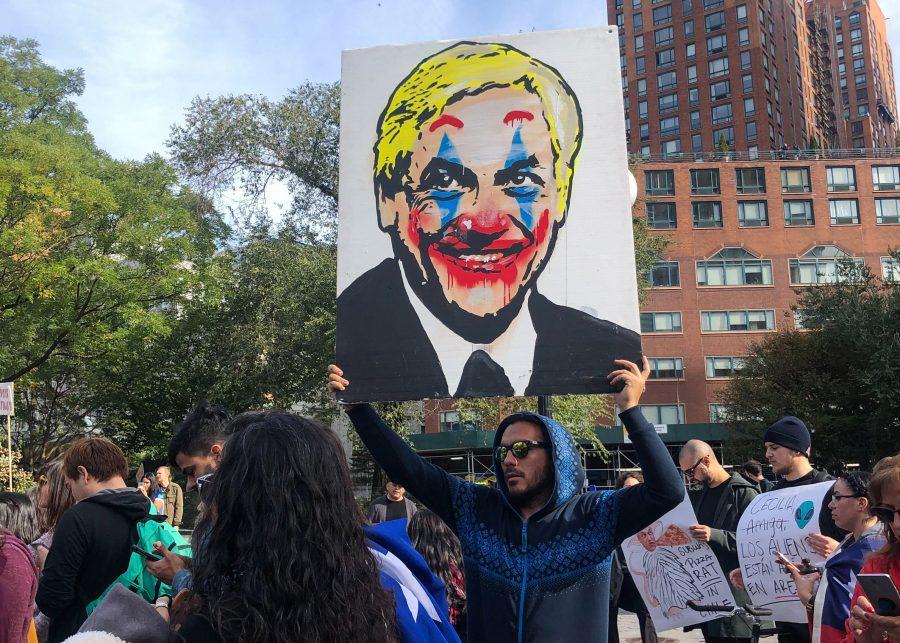The clanking of pots and choruses of Spanish-language revolutionary tunes rose from a sea of undulating red and blue flags at a Union Square protest against inequality perpetuated by the Chilean government.
The protest — which amassed a dancing crowd of more than 200 on Saturday — was organized by local Latin American activists and coincided with thousands of other rallies in Santiago and across the world, all responding to inequality under Chilean President Sebastián Piñera.
The demonstrations began with a student protest over a 4% spike in Santiago metro fares. While the Union Square protest was nonviolent, protests in Chile throughout the last week have been accompanied by looting, arson and police brutality, leading to 18 civilian deaths.
Chile has the highest level of income inequality among 30 of the world’s wealthiest nations, according to the Organization for Economic Co-operation and Development. The U.S. is No. 4.
Piñera, who was reelected in 2018 after a previous term from 2010-2014, is Chile’s first democratically elected right-wing president since 1958. He was preceded by Chile’s first female president, progressive Michelle Bachelet.
In response to the rallies, Piñera has nixed the rise in fares and, during a televised apology, promised increases in the minimum wage and a 20% rise in government-subsidized pensions, among other things. He also announced plans to dramatically restructure his cabinet on Saturday morning, although he hasn’t specified how.

Union Square protestors expressed that they were still angry and planned to continue the global fight for equality.
“It’s 30 years of inequality with pay, wages, education,” said New York City College of Technology junior Andres Pera-Leyton, who attended the Union Square protest. “We want our voices heard around the world, not just in Latin America.”
Pera-Leyton joined a slew of other Chilean-Americans who came to the protest in solidarity with their family and friends back home. For American Musical and Dramatic Academy ’19 alumna Ashlee Reed, whose parents live in Chile, urgency of protest is particularly profound.
“We’re just here for our people,” Reed said. “I was raised over there so it comes from home […] in general it’s been very rough for all of our families.”
For college student Annell Moya, the protests in Santiago recall protests over violence against women that took place in her native South Africa last month. Moya attended Saturday’s protest in solidarity with her Chilean friend.
“No matter what race you are — Chilean, Puerto Rican, South African,” Moya said. “It doesn’t make a difference where we come from, it’s how we stand together.”
Social media influencer Edmundo Huerta — who goes by Di Mondo, which means “of the world” in Italian — has experienced first-hand the effects of inequality in Chile. Di Mondo lived in Chile for a substantial period and his parents were exiled from the country during the Augusto Pinochet dictatorship. At Saturday’s protest, he wore a red cap, blue tailcoat and red pants, emulating the Chilean flag.
“For me it’s really not a political cause, it’s a social cause because there’s so much inequality and injustice in the totality of the system,” Di Mondo told WSN. “When I was 10, we moved to Chile, so the second half of my childhood I grew up [there].”
Like Di Mondo, many Chileans feel Piñera’s current rule is uncomfortably similar to military dictatorships of the past, Pinochet’s in particular. Pinochet ousted former Marxist president Salvador Allende — whose administration was stained by high inflation rates, public starvation and general unrest — through a tumultuous U.S.-backed military coup that led to Allende’s suicide in 1973.
Protestors said that Piñera’s perceived indifference to the struggles of the lower class mirrors that of Pinochet, whose regime also saw increased police presence and violence on the streets. Piñera’s cabinet currently includes formerly vocal proponents of Pinochet, such as interior minister Andrés Chadwick.
“It’s kinda like history repeating itself,” Pera-Leyton said. “[Political oppression] is something that our parents and older [generations] grew up with; we want to stand up against that.”
A version of this article appeared in the Monday, October 28, 2019 print edition. Email Lisa Cochran at [email protected].
























































































































































